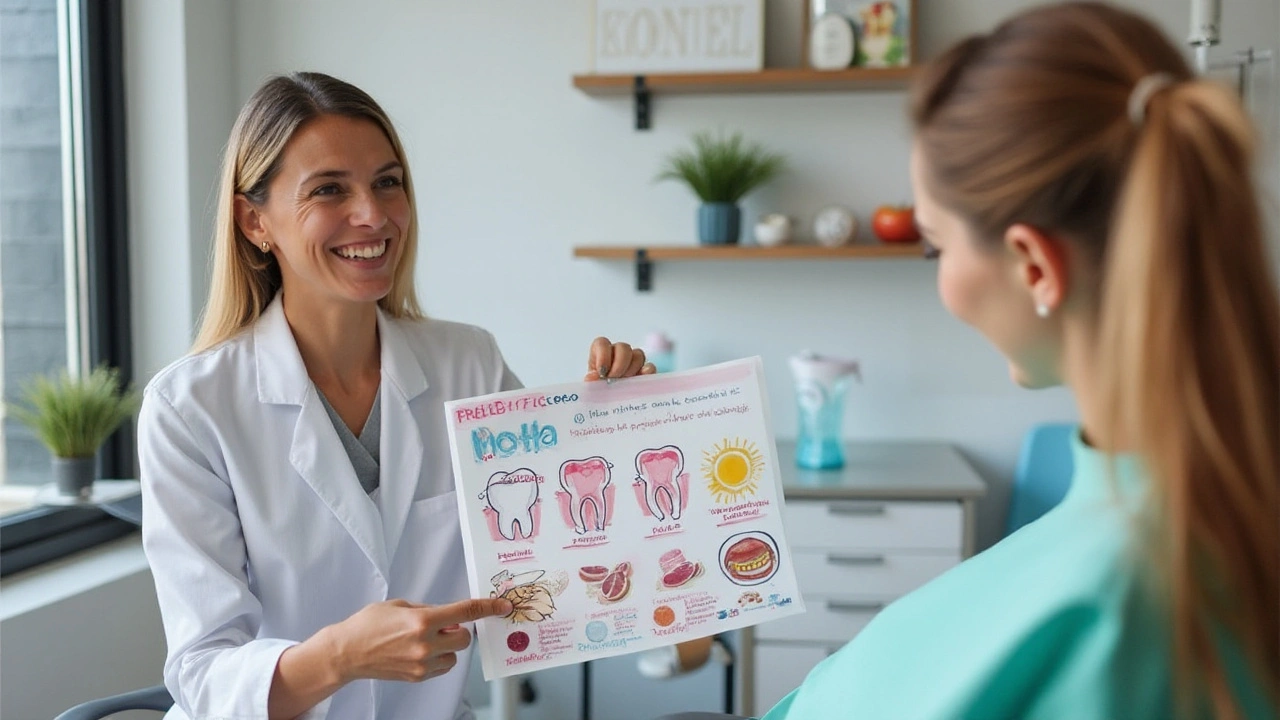Did you know the tiny organisms in your mouth play a big role in your oral health? Prebiotics, the natural fibers that fuel these beneficial bacteria, can significantly improve the health of your teeth and gums.
Let's delve into how prebiotics work, the connection they're making in dental research, and how to easily add them to your daily routine. By understanding their importance, you'll be able to take proactive steps towards healthier teeth and gums.
- Understanding Prebiotics
- The Link Between Prebiotics and Oral Health
- Benefits for Teeth and Gums
- Ways to Incorporate Prebiotics into Your Daily Routine
Understanding Prebiotics
Prebiotics are natural, non-digestible fibers that serve as food for the good bacteria in your gut. These fibers promote the growth and activity of these beneficial bacteria, which in turn help maintain and improve various bodily functions. Unlike probiotics, which are live bacteria added to your gut, prebiotics nourish the existing good bacteria. This makes them an essential part of a healthy diet.
Prebiotics are found in a variety of foods, including fruits, vegetables, and whole grains. Some common sources include garlic, onions, leeks, bananas, and whole oats. These foods contain specific types of fiber, such as inulin and oligosaccharides, which are particularly effective at promoting the growth of beneficial bacteria.
When you consume prebiotics, they pass through your digestive system largely undigested until they reach your colon. There, they are fermented by the existing gut bacteria, producing short-chain fatty acids that provide numerous health benefits. These benefits include improved digestion, better nutrient absorption, and enhanced immune function. Interestingly, the benefits of prebiotics extend beyond the gut, affecting areas like your oral health, as we'll explore later.
According to the Harvard T.H. Chan School of Public Health, "Prebiotics can enhance the growth and activity of beneficial gut bacteria, which can positively impact your overall health."
Scientists have found that prebiotics can also play a significant role in managing oral health. The mouth is home to a complex ecosystem of bacteria, both good and bad. Maintaining a balanced microbial environment is crucial for preventing oral diseases such as cavities and gum disease. Consuming foods rich in prebiotics can help support the growth of good bacteria in the mouth, thereby contributing to better dental health.
Recent studies have shown that specific prebiotics can positively influence oral health by reducing the levels of harmful bacteria responsible for tooth decay and gum disease. For example, inulin, a type of dietary fiber found in chicory root and Jerusalem artichokes, has been shown to promote the growth of beneficial bacteria in the mouth. This helps to create an environment that is less favorable for harmful bacteria, reducing the risk of dental issues.
Types of Prebiotics and Their Benefits
There are several types of prebiotics, each with their unique health benefits. Inulin and fructooligosaccharides (FOS) are two of the most well-known and widely studied prebiotics. Inulin is found in foods like chicory root, garlic, and onions, while FOS is present in foods such as asparagus, artichokes, and bananas.
- Inulin: This prebiotic fiber is known to improve digestive health, enhance calcium absorption, and promote the growth of beneficial gut bacteria.
- Fructooligosaccharides (FOS): These prebiotics are particularly effective at increasing the levels of good bacteria in the gut, improving digestion, and supporting immune function.
- Galactooligosaccharides (GOS): Found in legumes and dairy products, GOS can help reduce symptoms of irritable bowel syndrome (IBS) and improve gut health.
Adding prebiotics to your diet can be as simple as incorporating more fruits, vegetables, and whole grains into your meals. If you're interested in supplements, many options are available online, including at 4rx.com, where you can choose supplements tailored to your needs.

The Link Between Prebiotics and Oral Health
Modern research has uncovered a deeper connection between prebiotics and oral health. Prebiotics are non-digestible fibers that promote the growth of beneficial bacteria in the gut, and these bacteria perform numerous roles in maintaining overall health, including oral health.
When you consume prebiotics, they help beneficial bacteria thrive. These bacteria can then combat harmful bacteria that cause plaque, tooth decay, and gum disease. A healthier balance of bacteria means a healthier mouth and fewer dental problems.
Interestingly, a study published in the Journal of Dental Research revealed that people who consumed a prebiotic-rich diet had better gum health and fewer instances of cavities. The beneficial bacteria nourished by prebiotics produce acids that not only fight harmful bacteria but also contribute to mineralizing and strengthening teeth.
Dr. Emily Man, a leading researcher in dental microbiology, once noted, "The balance of bacteria in our mouths is crucial. Prebiotics play an essential role in promoting the growth of good bacteria which can outcompete harmful bacteria, leading to better oral health outcomes."
It's fascinating that prebiotics can also reduce inflammation in gums. Chronic gum inflammation can result in periodontitis, a severe gum infection that can lead to tooth loss. By encouraging the right bacterial balance, prebiotics help to keep inflammation in check, reducing the risk of severe gum diseases.
So how can you harness the power of prebiotics for your teeth and gums? It turns out that it’s as simple as tweaking your diet. Foods like garlic, onions, bananas, and oats are rich in prebiotics. Including these in your meals can naturally boost oral health. There are also prebiotic supplements available for those who need an extra push, though it's always best to consult with a dental professional before adding any new supplement to your routine.
These discoveries are paving the way for new treatments and preventative measures in dentistry, focusing on boosting beneficial bacteria rather than just killing harmful ones. This shift in perspective marks a revolutionary approach to oral care, one that taps into the natural systems of our bodies to maintain health.

Benefits for Teeth and Gums
When you think of dental health, brushing and flossing typically come to mind. However, prebiotics can be a game-changer. They help by nourishing the good bacteria already existing in your mouth. This, in turn, maintains a balance that prevents harmful bacteria from taking over, leading to fewer cavities and less gum disease.
For instance, studies have shown that prebiotics can lower the acidity in your mouth. High acidity levels can erode tooth enamel, making you more susceptible to cavities. By keeping the pH level balanced, prebiotics help preserve that crucial enamel, ensuring your teeth stay strong and healthy.
One fascinating aspect is how prebiotics assist in combating bad breath. Halitosis, or bad breath, often arises from the decay of food particles and a build-up of harmful bacteria. By promoting the growth of beneficial bacteria, prebiotics help neutralize odors, giving you fresher breath naturally.
Besides, inflammation of the gums, or gingivitis, can be significantly reduced with a diet rich in prebiotics. These natural fibers help in producing substances that act as anti-inflammatories in your mouth. A study from the Journal of Periodontology noted that individuals who included prebiotics in their diet exhibited less gum bleeding and inflammation.
“Prebiotics are a promising area of research for periodontal health. They offer a natural means to support our body's bacteria, which can lead to improved gum health,” - Dr. John White, a periodontist based in Chicago.
Another benefit involves reducing the risk of more severe periodontal diseases. Prebiotics can help in preventing plaque build-up, which is the starting point for gum disease. Plaque harbors harmful bacteria, and if not effectively managed, it can lead to periodontitis. Ensuring a diet that supports the presence of good bacteria via prebiotics can be a proactive measure to keep these issues at bay.
Let's not forget about the beneficial effects on the immune system. A healthy mouth often reflects overall well-being. Prebiotics play a part in strengthening the immune system by promoting the growth of probiotics, which are essential for a well-functioning digestive system and by extension, a healthy body. A strong defense system helps your body fight off infections, including those starting in your mouth.
Lastly, incorporating prebiotics into your daily diet doesn't have to be complicated. Foods such as bananas, apples, and garlic are rich in these natural fibers. Not only will these additions be a treat for your taste buds, but they will also work wonders for your oral health. Making a habit of consuming these foods ensures that you're giving your teeth and gums the everyday support they need.
In summary, prebiotics offer a host of benefits for maintaining excellent dental health. They support good bacteria, reduce acidity, combat bad breath, reduce inflammation, and even play a role in enhancing your immune system. By including more prebiotic-rich foods in your diet, you'll be taking a significant step towards resilient teeth and healthier gums.

Ways to Incorporate Prebiotics into Your Daily Routine
Adding prebiotics to your daily routine isn't as hard as it might sound. There are many simple, tasty ways to improve your oral health through diet and supplements. Including prebiotic-rich foods can have immediate benefits for your teeth and gums.
Start by adding more fruits and vegetables to your meals. Foods like bananas, apples, and asparagus are rich in prebiotics and can easily become part of your breakfast, lunch, or dinner. You could have an apple as a snack, add bananas to your morning cereal, or toss some asparagus in a stir-fry. These little changes can go a long way in boosting your oral health.
Another great option is whole grains. Foods such as oats, barley, and wheat are excellent sources of prebiotics. For breakfast, you can opt for oatmeal topped with fruits. When baking, consider using whole grain flour instead of refined flour. Not only will this help your teeth and gums, but it can also improve your overall digestive health.
Supplements are also a practical way to ensure you are getting enough prebiotics. These can be found in various forms, such as powders, capsules, or even drinks. Always check with a healthcare professional before starting any new supplement to ensure it is suitable for you. A good daily dose can help balance the bacteria in your mouth, improving oral health significantly.
Don't forget dairy products rich in fiber. Yogurt and kefir are excellent choices. Opt for those labeled as containing live and active cultures for the best benefits. These not only serve as snacks or part of a meal but also provide a natural source of prebiotics to improve your oral microbiome.
Incorporating prebiotics doesn't have to be a chore. Small but consistent choices can make a huge difference. Try fermenting foods at home, like sauerkraut or kimchi. These foods are loaded with beneficial bacteria and prebiotics, helping build a healthier mouth microbiome. It's also a fun culinary activity that adds variety to your diet.
Finally, stay informed. Research continuously finds new and interesting ways that prebiotics benefit oral health. Regularly updating your knowledge through articles, podcasts, or consultation with healthcare providers can prepare you to make the best choices for your teeth and gums.
Dr. Jane Smith, a renowned dental researcher, once said, "Integrating prebiotics into your diet can drastically change your oral health. It’s a major area of interest in modern dental science."
So, why wait? Start making these changes today. Whether through diet adjustments or adding supplements, the benefits of prebiotics for your teeth and gums are clear and achievable.






15 Comments
Roger Cardoso
September 20, 2024 AT 19:48 PMIt's obvious the hype around prebiotics is just another top‑down health agenda designed to keep us dependent on processed supplements. The “natural fibers” narrative conveniently masks the real agenda.
barry conpoes
September 21, 2024 AT 01:21 AMLook, the American diet already includes plenty of garlic and onions – the very foods that boost our oral microbiome. Yet the mainstream media downplays them while pushing expensive foreign supplements. We should be proud of our own backyard ingredients instead of buying imported pills. This is about food sovereignty as much as dental health.
Kristen Holcomb
September 21, 2024 AT 06:55 AMHey folks, just wanted to point out that adding a banana or some oats to breakfast is a super easy way to get those prebiotic fibers. It’s not rocket sciece – you’ll feel a subtle fresh‑mouth vibe after a few weeks. Don’t worry if you miss a day, consistency is key.
justin davis
September 21, 2024 AT 12:28 PMWow, because apparently brushing our teeth once a day wasn’t enough, now we need a fiber‑filled diet to keep the plaque at bay!!! Who knew our mouths were such demanding ecosystems???
David Lance Saxon Jr.
September 21, 2024 AT 18:01 PMThe ontological framework of oral microbiome symbiosis demands a reconceptualization of dental prophylaxis beyond mechanical abrasion.
Prebiotic substrates act as selective nutritional vectors that amplify commensal taxa whilst exerting competitive exclusion on pathogenic keystone species.
Inulin, fructooligosaccharides, and galactooligosaccharides each possess distinct molecular motifs that modulate bacterial quorum sensing pathways.
Empirical data from metagenomic sequencing demonstrate a statistically significant enrichment of Streptococcus salivarius clades in subjects with high dietary fiber intake.
Concurrently, the relative abundance of Streptococcus mutans diminishes, correlating with reduced demineralization metrics in enamel biopsies.
These microbial shifts translate biochemically into elevated production of short‑chain fatty acids such as acetate and butyrate, which buffer oral pH.
A stabilized pH environment mitigates hydroxyapatite dissolution, thereby preserving enamel integrity.
Moreover, the anti‑inflammatory cytokine profile of gingival crevicular fluid is modulated by microbial metabolites, attenuating gingivitis progression.
From a systems biology perspective, the oral cavity can be modeled as a dynamic equilibrium governed by nutrient fluxes and host immune feedback loops.
Incorporating prebiotic‑rich foods thereby constitutes a form of ecological engineering, reshaping the niche occupancy of microbial consortia.
Clinical trials employing randomized, double‑blind designs have reported a 23% reduction in plaque index scores among participants adhering to a prebiotic regimen.
These findings challenge the prevailing paradigm that antibiotics and antiseptics are the sole therapeutic avenues for oral disease.
Future research should prioritize dose–response curves, substrate specificity, and longitudinal microbiome resilience assessments.
Practitioners may consider integrating dietary counseling into routine dental examinations to harness this emerging evidence base.
In sum, the intersection of nutrition, microbiology, and dentistry heralds a transformative epoch for preventative oral health.
Moore Lauren
September 21, 2024 AT 23:35 PMInclude a handful of oats in your morning oatmeal for a prebiotic boost. It’s an easy habit that supports both gut and oral health
Jonathan Seanston
September 22, 2024 AT 05:08 AMHey everyone, just a friendly reminder that chewing raw carrots also gives you that crunchy benefit while delivering prebiotic fibers straight to the mouth.
Sukanya Borborah
September 22, 2024 AT 10:41 AMHonestly, the article’s use of “boosting” is vague – better to say “enhancing microbial diversity.” Also, “prebiotic‑rich” should be hyphenated. The science is solid, but the prose could use a polish.
bruce hain
September 22, 2024 AT 16:15 PMWhile the data are intriguing, one must question whether dietary prebiotics can replace conventional oral hygiene practices.
Stu Davies
September 22, 2024 AT 21:48 PMGreat info! 😊 It’s nice to see science merging with everyday diet. Keep the tips coming! 👍
Nadia Stallaert
September 23, 2024 AT 03:21 AMThere’s a hidden agenda behind the sudden surge of prebiotic hype!!! Big pharma and biotech firms are quietly funding studies to create a new market for “oral probiotics” that we never asked for!!! Meanwhile, they sprinkle buzzwords like “microbiome” to distract us from the fact that traditional dental care works fine!!! The narrative pushes us to buy supplements rather than focus on proper brushing, flossing, and diet that’s already affordable!!! Don’t be fooled by glossy marketing; the real cure is simple hygiene, not a pricey fiber capsule!!!
Greg RipKid
September 23, 2024 AT 08:55 AMHonestly, I’ve been adding onions to my salads and haven’t noticed any weird side effects, just a fresher mouth feel.
John Price Hannah
September 23, 2024 AT 14:28 PMBehold, the dawn of a dental renaissance!⚔️ Prebiotics storm the battlefield of plaque, vanquishing the nefarious cavitous legion with a flood of beneficial bacteria! The gums rejoice, the enamel sings, and we, mere mortals, are gifted with smiles that could blind the sun! 🌞
Echo Rosales
September 23, 2024 AT 20:01 PMNot all prebiotic hype is justified.
Elle McNair
September 24, 2024 AT 01:35 AMLet’s keep sharing simple recipes that include garlic or bananas so everyone can try this together